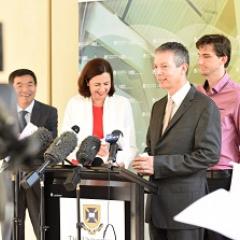
Treatment with scanning ultrasound has already been shown to reverse Alzheimer’s disease in mice, and now it appears it could also slow down ageing in healthy brains, according to University of Queensland research.
The paper is the latest work from Professor Jürgen Götz’s lab in the Clem Jones Centre for Ageing Dementia Research at the Queensland Brain Institute.
The study showed that scanning ultrasound prevented degeneration of cells in the brains of healthy mice.
Senior author Dr Robert Hatch said the research was originally designed as a safety study, but soon revealed a broader role for ultrasound in maintaining brain health.
“We found that, far from causing any damage to the healthy brain, ultrasound treatments may in fact have potential beneficial effects for healthy ageing brains.” Dr Hatch said.
“In a normal brain, the structure of neuronal cells in the hippocampus, a brain area extremely important for learning and memory, is reduced with age.”
“What we found is that treating mice with scanning ultrasound prevents this reduction in structure, which suggests that by using this approach we can keep the structure of the brain younger as we get older.”
“We are currently conducting experiments to see if this preservation of the brain cell structure will ameliorate reductions in learning and memory that occurs with ageing.”
Ultrasound brain research builds on Alzheimer's disease breakthrough
In the next stage of research, the team will test the effect of ultrasound on the brain structure and function of older mice.
Professor Götz’s lab has previously shown that non-invasive ultrasound technology can reverse Alzheimer’s disease in mice.
The approach is able to temporarily open the blood-brain barrier, activating mechanisms that clear toxic protein clumps and restore memory functions.
“Collectively, this research is fundamentally changing our understanding of not only how to treat Alzheimer’s, but that interventions such as ultrasound scanning can prevent the detrimental effects of aging,” Dr Hatch said.
“This is a pressing health issue in an ageing society and it’s clear that scanning ultrasound technology has potentially significant applications.”
Alzheimer’s disease affects more than two thirds of dementia patients, and approximately a quarter of a million Australians.
The total number of dementia cases in Australia is expected to rise to 900,000 by 2050.
This research is published in PloS One and is funded by the Estate of Dr Clem Jones AO and by grants from the ARC, the NHMRC, and the Australian Research Council Linkage Infrastructure, Equipment and Facilities scheme.




